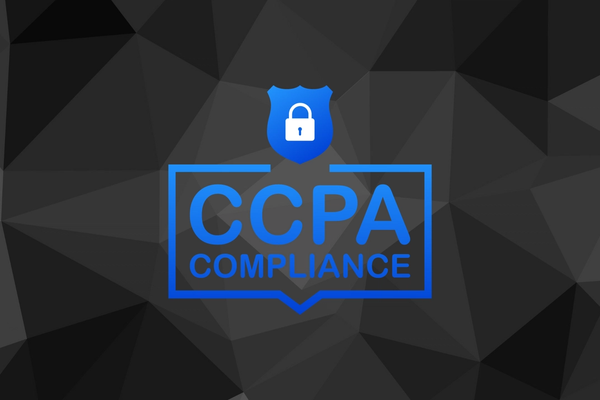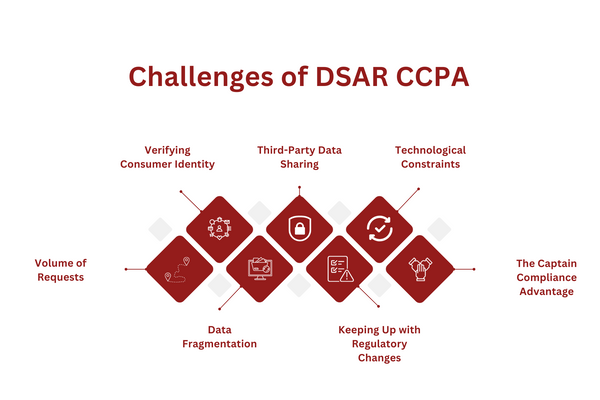
The DSAR CCPA rules in California aim to give people more control over their personal data.
These California Consumer Privacy Act (CCPA) rights let customers ask businesses what data they have about them, and they can also ask them to delete it, among many other things. This article explains why these rights matter and how to manage them.
We’ll see what steps businesses need to take to follow the rules properly and how it’s meant to help businesses handle data the right way under the law. Let’s dive deeper into the DSAR CCPA regulations!
Key Takeaways
The CCPA, which can impose hefty CCPA fines for non-compliance, gives people more control over their personal information and emphasizes the importance of data protection.
One important part of the law is DSARs, which let customers ask businesses to see the data collected about them and even request for it to be edited or deleted.
Handling all those DSAR and privacy requests can be tricky for businesses. There are steps they can take to make things smoother, though. Making it simple for people to submit DSARs and keeping records helps businesses stay on top of everything.
CCPA Overview
CCPA Overview.png

California passed a privacy law called the CCPA that gives people more control over their personal information. The law, focusing on data protection, says that if you deal with customers who live in California, you have to tell them what data you’ve collected about them if they ask. They can also tell you to delete it or not to sell it.
Before the introduction of CPRA and CCPA, businesses could just take people’s information and sell it without asking, and there were few regulations that protected this data.
The CCPA makes them get permission first. It also forces businesses to be more careful with personal data – they have to know where it comes from, who they share it with, and how they use it, and if they break the rules, they can be fined or worse.
The main goal of the CCPA is to give people more power over their own information and ensure better data protection. Customers also have the right to see what data businesses have about you. It’s about transparency – making businesses tell you what data they have and where it came from.
This law makes businesses more accountable for handling personal information safely and responsibly. People have more control now over how their personal data is collected and shared.
What Exactly is a DSAR (Data Subject Access Request)?
What Exactly is a DSAR (Data Subject Access Request).png

Data Subject Access Requests, or DSARs for short, are important new rights people have under California’s privacy law, the CCPA. Basically, it lets customers ask businesses what personal information they have about customers.
These requests are a big deal for giving people more control over their personal data. By law, businesses have to show you what they’ve collected – your name, address, and any other data collected.
This helps customers understand how their info is being used and ask for changes if they want, like fixing mistakes or telling businesses to delete it or stop selling it.
For businesses, DSARs are a whole new compliance thing they gotta deal with. They have to drop what they’re doing and get people the data they ask for or risk getting into trouble.
So, businesses often scramble to get their DSAR processes in order. But with the help of compliance services, like Captain Compliance, it becomes much more manageable for them.
It’s an adjustment for everyone, but DSARs are a game changer for data privacy. They finally give people a peek under the hood at how their personal information is collected and used, ensuring better data protection.
How to Manage DSAR CCPA Effectively
These days, data is super valuable to companies, making personal data protection a top priority.
But we have to handle it carefully, especially with laws like the CPRA and the CCPA that say people have rights to the data that businesses collect.
So, businesses need a process for dealing with Data Subject Access Requests (DSARs). Here are the steps your business can take to handle DSARs smoothly.
Create an Easy Way for Subjects to Submit Requests
Having a straightforward way for consumers to submit data access requests is super important.
It could be a form on your site or an email address just for that purpose. Either way, making it easy to understand and find and putting up an FAQ, having chat support, or just clear instructions helps a ton too. The easier it is for customers to do it, the more they’ll trust you.
Information to Provide
The California Consumer Privacy Act says that businesses need to be upfront about the information they get about people. This means letting folks know about the following:
Categories of Data: Are you getting names, addresses, browsing history, purchases, or something else?
Data Sources: Did you get it straight from the person, from somewhere else, or by tracking them online?
Purpose: Are you using it for marketing, making your services better research, or what?
Data Sharing: Are you sharing it with partners, vendors, affiliates, or anyone else?
Specific Data Points: If someone asks, you should be ready to give them the specific bits of info you’ve collected about them.
Rights to Provide
Under the CCPA, individuals have a range of rights related to the personal data that businesses collect. Businesses should inform customers about these rights and provide an easy way for consumers to exercise them:
Right to Deletion: Consumers have the right to ask your business to delete all information it has collected from them.
Opt-Out Rights: If you sell consumer’s personal info, they need to be provided with a clear option (often called “Do Not Sell My Personal Info”) so as not to opt in this process without consent.
Child Consent Requirement: For children under 16, explicit consent is required from either them or their parents/guardians if they are younger than that before selling any personal information.
Non-Discrimination Rights: You can’t discriminate against consumers who exercise these rights – this means not denying products/services, charging different prices/rates, providing a lower quality service, etc.
Verify Identity
You have to be careful who you’re giving info these days. Businesses and consumers both need to watch their backs. There are ways to check someone is who they say, though.
Password-protected accounts, security questions, two-factor authentication, and ID checks can help verify things, and if there’s some third party in the mix, they need to have clear permission from whoever they’re repping.
Respond in a Timely Manner
The CCPA says businesses need to respond to DSARs within 45 days, and if you need to wait for some reason, you can extend it another 45 days.
But keep the person in the loop about what’s going on and if there are holdups. Being upfront builds trust and shows you respect their rights and wanna be transparent.
Document and Record all DSARs
Good record-keeping is so important with this stuff. You must write down everything about the consumer data requests you get – whether you gave them their info, you’re still working on it, or told them no, and it helps later on if somebody checks up on how you handled things.
Plus, it clues you in on what people ask about a lot, so maybe you can do better at handling data next time. And it shows you’re trying to be open about the data you have, plus you’ll be ready if the rules change or someone asks questions later.
Contact Captain Compliance
Dealing with all the ins and outs of data subject access requests can definitely be tricky!
Whenever you’re not totally sure what to do or could use some expert help, our DSAR solution here at Captain Compliance has you covered. With our experience, tools, and other resources, we can make managing DSARs feel like a total breeze.
Our crew is always ready to handle your compliance needs so businesses can respond to DSARs with total confidence and maximum efficiency, and having Captain Compliance on your side means you’re not just crossing the compliance finish line – you’re lapping all the other runners!
Challenges of DSAR CCPA
Challenges of DSAR CCPA.png

The introduction of the CCPA has undoubtedly empowered consumers, but it also presents businesses with a unique set of challenges. Navigating the DSAR landscape requires a deep understanding of these challenges and the strategies to address them.
Volume of Requests
Dealing with folks asking for their data (DSARs) is pretty simple on its own. But when a whole bunch rolls in at once, it gets tricky, logistically speaking. Like, think of a popular online shop.
Businesses may get a ton of DSARs every day, especially around big sales or after some new ad campaign, and imagine a business that just launched a new product.
Their website traffic blows up. So now both new and regular consumers are asking left and right to see what info the business’s got on them.
Verifying Consumer Identity
Making sure a DSAR request is legit is so important. Just a small mistake could end in a costly data leak and get you in legal trouble. Only checking basic stuff to confirm who someone is can be super risky.
Say a bank gets a delete request from a person saying they’ve had an account there forever, and if the bank doesn’t really make sure it’s them, private financial info could get to some scammer.
Data Fragmentation
Consumer information is usually spread out over many different systems these days. Trying to gather it all up for a DSAR thing can be a huge pain, especially for businesses using old systems.
This split-up data can mean it takes longer to respond, mistakes happen more, and you risk breaking the law on accident.
Like, think about a big global airline business. A person who flies with them all the time probably has their stuff in the booking computer records of what they buy on the plane and any rewards programs they joined.
Third-Party Data Sharing
When businesses work with outside vendors, making sure those partners respect data deletion requests is key but tricky. The complicated spiderweb of shared data duties can muddy who’s really accountable.
So it’s essential for businesses to lock down clear contracts upfront. For example, a health and fitness app may share user info with other businesses. Handling each data deletion request would mean coordinating with each of these other businesses.
Keeping Up with Regulatory Changes
Data privacy laws keep changing, which makes it tough for businesses working across different places to keep up.
But staying current is so important. Training and double-checking everyone gets what the rules are now really helps ensure the whole business is on the same page about the latest privacy rules.
Like, think of a big online store that’s everywhere. They have to handle folks asking for their data based on that CCPA and the GDPR rules in the EU and whatever else based on where the person is. It’s tricky keeping all those straight.
Technological Constraints
Managing data requests can be a real pain when your business is still using old-school paper records and clunky databases. Upgrading to new systems would make compliance a heck of a lot easier.
DSARs could be handled with a few clicks instead of hours of digging, and snazzier tech doesn’t just help with data requests. It beefs up security and makes the whole operation more streamlined.
The Captain Compliance Advantage
Managing data subject access requests can get pretty tricky, which is why many businesses opt for outsourced compliance.
Captain Compliance is here to be your reliable partner for dealing with this stuff, and we use our know-how and custom solutions to make the process less of a headache and keep everything compliant from start to finish.
Think of a quickly expanding startup suddenly flooded with requests to access private data, and the importance of compliance training becomes clear. If they don’t have the right frameworks in place, it could turn into a mess really fast.
That’s where we step in. Our crew makes sure each request gets handled properly so these businesses can keep their attention on their main work without worrying.
Closing
Handling stuff like DSARs seems like a huge headache, I know. But listen – you don’t have to figure this out alone. Captain Compliance can walk you through it and make the whole process feel less intimidating.
If you’re staring at a big pile of DSAR requests and wondering what to do, get in touch with us.
We really know this stuff inside and out, and we want to help businesses succeed. With our tools and experience on your side, you can turn DSARs from a scary mess into a manageable to-do list. Having them in your corner makes tackling privacy compliance seem way less frustrating.
So don’t let yourself feel overwhelmed. Captain Compliance has got your back when it comes to DSARs, the California Consumer Privacy Act, and everything related to data privacy. We’ll help you navigate the twists and turns so you can keep moving forward with confidence.
FAQs
What’s DSAR CCPA All About?
DSAR CCPA is a rule in California. It lets people ask businesses about the personal info they have on them. It’s about giving folks more control over their own data.
Want to dive deeper? Check out our detailed guide on CCPA.
Why Should Businesses Care About DSAR CCPA?
Businesses should care because it’s the law. If they don’t follow it, they can get into big trouble. Plus, it’s good for trust. Consumers like knowing businesses respect their privacy.
Need help managing DSARs? Captain Compliance is here to help.
How Do DSARs Change Things for Businesses?
DSARs mean businesses have to be ready to show people their data. They also might have to delete it if asked. It’s a new thing businesses have to do, but it’s important.
Just starting out with DSARs? Click here to find out more.
Can Captain Compliance Help with DSAR CCPA?
Totally! Captain Compliance knows all about DSAR CCPA. We’ve got tools and experts to help businesses handle it all smoothly.
Ready to get started? Reach out to Captain Compliance today.